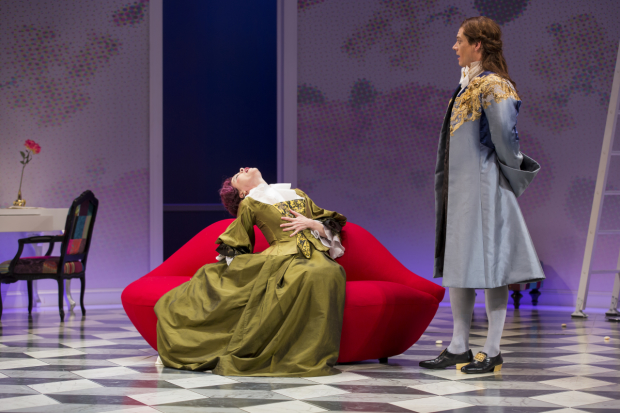
(© Scott Suchman)
In the best of all possible worlds, the Shakespeare Theatre Company would be able to resuscitate Molière so he could update his 1666 classic Le Misanthrope into a comedy as relevant to the 21st century as it was to the 17th. But since that's impossible, the S.T.C. is doing the second-best thing for the last production of its 2016-17 season: producing an updated version of David Ives' brilliant remake of Le Misanthrope, The School for Lies. This is a shorter, tighter satire, also written in rhymed couplets that reference many local and national current events and incorporate plenty of contemporary slang.
The play takes place in 1666 Paris in Célimène's drawing room, supposedly two years after Molière's play ended. It is a glamorous world where gossip, scandal, and influence are all-important elements to everyone except the main character, Frank. Newly returned to Paris, Frank claims to hate hypocrisy, pomposity, and social conventions. He sets out to show up the liars and rogues in positions of power in French society for what they are.
Despite his convictions, however, Frank cannot help but love the flirtatious and playful Célimène, a young widow whose wit epitomizes the courtly style that Frank says he despises. Though he constantly reprimands her, Célimène refuses to change and entraps him with her beauty and grace.
Frank and Célimène are surrounded by other extravagant characters: Célimène's cousin, Eliante; Eliante's suitor, Philinte; Clitander, a courtier; Oronte, an unskilled poet; Acaste, a wealthy marquis; and Arsinoé, the town gossip. The plot is paper thin and delightfully silly. Frank gets in trouble for criticizing a horrible poem by Oronte, and Célimène is led to think that Frank has influence with the king.
Gregory Wooddell is excellent as Frank, a man who sees accurately that everyone around him is telling lies and he insists on criticizing them, thinking that his point of view will inspire them to change and become morally forthright. Victoria Frings is a charming match for Frank. Frings plays Célimène as a very intelligent woman who immediately sees that Frank is a smart as she is. Her imitations of the people around town are hilarious: "D" is an exercise enthusiast and numbskull, who speaks in a hip-hop cadence. Veanne Cox is brilliant as Arsinoé. Cox's voice is deep and rich and when she infuses it with sardonic barbs intended to destroy Célimène, there is nothing better.
Dorea Schmidt plays Célimène's cousin who falls in love with Frank without realizing that they are utterly unfit for one another. The man she is destined for is Philinte, who spends the entire play vainly trying to convince her to love him. Cody Nickell is dynamic in the role of Philinte.
Tom Story is hilarious as the poet Oronte, who is mortally offended by Frank's criticism of one of his poems. Liam Craig plays Acaste as a haughty man who believes his money will get him whatever wants. Cameron Folmar plays Clitander as something of a windbag, who knows he won't get the girl. Michael Glenn is very funny doubling in two roles.
Michael Kahn directs the show at a fast pace, as though it were a French bedroom farce. The floor of Alexander Dodge's magnificent set is black, white, and gray parquet marble. The room is nearly empty except for a bright red lip-shaped love seat, a few chairs, including one in the shape of a great golden hand, a very tall white chiffonier, and eccentric elements suspended from the ceiling.
Murell Horton's costumes for the women include a raspberry ombré dress for Celimene. The men's costumes include exaggerated wigs for Philinte, Oronte, Acaste, and Clitander in a variety of outrageous pointed shapes and colors. Frank wears black at the beginning of the play, but switches to a blue satin coat and pale blue hose half way through.
Ives didn't write a word-for-word translation of Le Misanthrope. He calls what he created a "translaptation," which fools with the structure, the plot, and the words of the play. But what remains as stunning as the original is Ives' brilliant language: the flowing iambic pentameter, which never once sounds forced, and the easy rhymes, which seem to fall naturally into place as they deal death blows to the malicious, back-stabbing would-be friends of Frank and Célimène.








